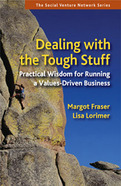Hispanics are the largest minority group and the fastest growing demographic in the United States—they are already 15% of the population and 22% of the workforce, and it’s estimated that by 2050 those numbers will go up to 36% and 55% In this much-needed new book Louis Naevar helps non-Hispanic employers and colleagues understand how Hispanics see the business world—and the world in general—so they can better support and develop this dynamic group of workers.
Drawing on his own ethnic background and years of experience as director of the organization Hispanic Economics, Nevaer identifies three concepts that shape Hispanic culture and often result in behaviors and beliefs very different than, and sometimes seemingly at odds with, those of non-Hispanics. He explores subtle nuances within the Hispanic community—which is no more monolithic than the “European” community—that will help employers appreciate differences and tensions between Hispanic workers. With this as an overarching framework, and using a wealth of specific examples, Nevaer shows how to develop Hispanic-friendly approaches in every aspect of the modern workplace, from recruitment, retention and evaluation to training, mentoring, and labor relations.
As Hispanics become an ever-larger segment of the workforce, organizations who fail to make them feel welcome and valued risk losing access to a significant source of talent and innovation, not to mention a connection to a major evolving market. Managing Hispanic and Latino Employees is an invaluable resource for creating an environment where Hispanic workers feel comfortable, recognized and rewarded.
2002
In all too many companies, once a business plan is created there is no systematic follow-up. The plan is filed and forgotten until it's time for the annual review-and the result is repeated failure to achieve goals and objectives. Seasoned organizational consultant Michele Bechtell draws on twenty years of experience to describe a straightforward, easy-to-implement, yet powerful set of business review techniques that will transform a traditional static paper plan into a reliable targeting process to produce quantum leaps in performance.
Bechtell shows how to:
- Identify the priority measures requiring continual review,
- Detect and respond to early warning signs,
- Accelerate the change process to drive current objectives,
- Link lessons from one cycle to the next for dramatic results, and much more.
Each chapter includes sample forms, tools, and graphics easily customized for your organization. If you are stretching toward a compelling vision, attempting to implement a strategy, or have tried and failed to achieve a desired goal or objective, this book is a must-read.
On Target shows that by making business review an ongoing process, rather than an isolated event, you can achieve dramatic results at any level of any organization.
- Offers detailed, practical advice on how to conduct an effective business review that will deliver dramatic results at any level of any organization
- By the author of the bestselling The Management Compass (87,000 copies sold)
- Shows how to achieve quantum leaps in performance by making business review an ongoing process, not an isolated event
A Company Discovers Its Soul is the engaging story of a year in the life of a fictional, yet true-to-life company as it undergoes profound transformation. Grounded in the author's own experiences in organizations, it is a tale that probes deeply into the "soul issues" of organizational life and offers an inspiring and realistic portrayal of how new principles and concepts evolve in everyday business reality.
Randall Hawkes was trained in modern business schools and is CEO of a company founded by his grandfather-a traditional, hierarchical organization that is facing decreasing profits, low morale, and competitors that are taking market share. Recognizing that the managerial techniques he learned in school are now producing dis-ease in himself, his family, his staff, and the organization, Randall becomes convinced that some kind of radical change must be made. Exploring the gradual changes in Randall's own thinking and way of leading the company, A Company Discovers Its Soul illustrates how such a process of change might happen. It shows how-through a combination of humility, courage, rigorous self- and mutual appraisal, and practice-Randall and his staff gradually learn to see the Hawkes Company as a living community.
Most important to this change process is Randall's own change in perception and thinking regarding his role in the organization and his notions about control, ownership, information sharing-and the resulting freedom for his staff, and everyone in the organization, to be more powerful and creative. By the end of the first year of this journey, The Hawkes Company staff has become more strongly aligned around their purpose and vision, the management team has truly become a team, relationships with suppliers and customers have been strengthened, and even their work environments have been improved as employees have taken ownership for maintaining their working spaces, and the plant in general.
Author Alan Green examines the changes that take place in the lives of the company's top management as they struggle to achieve greater effectiveness previously prevented by their control-oriented, narrowly functional roles. Readers will learn along with Randall as he combines the roles of servant, steward, partner, and leader in an effort to create an organizational culture that fosters creativity, cooperation, and resiliency.
- A true-to-life story that addresses the real issues that businesses struggle with every day
- Clearly distinguishes between real transformation and simply learning a new vocabulary
• Offers a completely new, "big picture" look at what causes whole industries to change
• Shows how this concept can be applied in any industry to unleash creativity and create dramatic improvements
• Demonstrates that many of the most important breakthroughs of the past 200 years resulted from applying this concept
2007
- Offers a systematic approach to overcoming one of many people's greatest fears: asking for help
- Explores why we are so reluctant to ask for help as well as precisely how to ask for it
- Illustrated with personal stories and anecdotes from the author's coaching practice
• Offers personal insights and advice from of some of the most successful socially conscious entrepreneurs in the country
• Features dozens of true stories revealing what it’s really like to run a values-driven business—the good, the bad and the ugly
• Includes tested tools, techniques and coping strategies for overcoming common and not-so-common challenges
Your business plan is only going to get you so far. When you’re actually running a values-driven business problems come up that you never could have anticipated. And as a mission-driven organization you face issues your more conventional colleagues never have to grapple with. The whole experience can be incredibly isolating and draining.
Margot Fraser and Lisa Lorimer have been there, and they’re here to help. Together with five of their colleagues—including Stonyfield Yogurt founder Gary Hirshberg and former Ms. Foundation president Marie C. Wilson—they offer the kinds of personal insights and seasoned advice you just can’t get in business school. It’s like having a coaching session with some of the nation’s top socially conscious entrepreneurs.
Each chapter of Dealing with the Tough Stuff tackles a particular challenge. How open and honest can you really be with your employees and still run an efficient business? At what point do you seek outside expertise? What do you do when things go terribly wrong? When is it time to leave? The authors and the members of their “advisory board” share their experiences—not just what worked, but sometimes what spectacularly didn’t. Some of these stories are harrowing: a worker getting killed by factory equipment, a supplier embezzling funds, a false accusation of intellectual property theft. Others are simply day-to-day conundrums: meeting payroll when you’re always in debt, deciding when and how to expand in a responsible way, balancing business needs with your commitment to the triple bottom line. At the end of each chapter, Lorimer and Frasier draw on the stories to offer practical "survival suggestions" that can guide readers through similar situations.
This is a book that readers can look to for affirmation, hope and tools. Others have been through what you’re going through, if not worse. They made it and so can you—because they’re going to show you how they did it. No book can cover every challenge that might arise, but if you learn from the attitudes, techniques and coping mechanisms these seasoned leaders offer, you’ll get through the tough stuff with your sanity and your business intact.




















